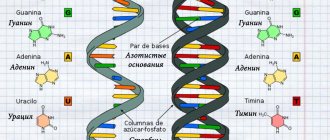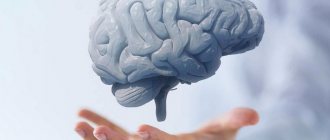General characteristics of memory
Memory is the remembering, preservation, reproduction and forgetting of traces of previous experience, giving a person the opportunity to accumulate information and deal with traces of previous experience after the phenomena that caused them have disappeared[1].
These are the processes of organizing past experience, making it possible for its subsequent use in activity or return to the sphere of consciousness. Memory connects the subject’s past with his present and future and is the most important cognitive function underlying development and learning [2] (Fig. 1).
Memory is the basis of any mental phenomenon. Sensations and perceptions without the inclusion of memory in the act of cognition would be experienced by a person as having arisen for the first time, which would exclude the possibility of cognition of the world and orientation in it. Memory ensures the unity and integrity of the human personality. Normal functioning of the individual and society is impossible without memory.
The role of memory in the professional activity of a lawyer cannot be overestimated. The memory of an investigator, lawyer, prosecutor, judge must be distinguished by the strength of remembering and reproducing important circumstances for him, by a high readiness to recall the required information and facts at the right time, and by sufficient volume. A professionally important quality of a lawyer is the ability to understand individual differences in the memory of a witness, victim, suspect, and accused. Using knowledge about the patterns of memory, the investigator can form witness statements, extracting from the memory of victims and accused information important for the investigation.
Memory functions
Reflective function
Memory reflects the past, creates its mnemonic image and thereby allows one to preserve and transmit not only the experience of the subject, but also the experience of past generations
Memory is the basis of any activity and behavior of the subject, since it is included in all levels, forms and classes of the psyche. Thanks to memory, a person is able to accumulate information and not lose previous knowledge and skills
Regulatory function
Rice. 1. Memory functions
From the point of view of the reflex theory of I.P. Pavlov’s memory processes are based on associations (by contiguity, similarity, contrast, etc.), which represent a temporary nervous connection. The degree of strength of the formation of connections is determined by the nature of the reinforcement (P.K. Anokhin).
Modern science puts forward a number of hypotheses about the mechanisms of memory:
- the memory mechanism is self-renewing biocurrents in nerve cells and other models;
- The memory mechanism plays an important role in the formation of memory traces of nucleic acids (in particular, ribonucleic acid - RNA) located in neuronal proteins. It has also been shown that brain activity during encoding (memorization) and reproduction is different and that short-term and long-term memory are realized by different brain structures.
In Russian psychology, when studying memory mechanisms, their dependence on the nature of activity is emphasized (P.P. Blonsky).
Basic properties of memory as a psychological phenomenon
Finished works on a similar topic
- Course work Properties of memory 440 rub.
- Abstract Properties of memory 270 rub.
- Test work Properties of memory 200 rub.
Receive completed work or specialist advice on your educational project Find out the cost
As a cognitive process, memory is characterized by the following properties:
- Volume – the ability to store significant amounts of information data;
- Accuracy - this property is manifested in memorizing not only the general content of information, but also individual facts and events;
- Readiness for reproduction is the ability to quickly reproduce information data in the mind of an individual. This property of memory allows a person to effectively use the previously accumulated existential experience;
- Speed of memorization is an individual characteristic of memory, which is reflected in the efficiency of memorizing information;
- Duration is the ability of an individual to retain the experience for a long time. It should be noted that this quality is individual and selective;
- Noise immunity is a property of memory that provides the ability of a person to resist background sounds, interference, and concentrate on the main information that must be stored in memory for subsequent reproduction.
Need some teacher advice on a similar topic? Ask a question to the teacher and get an answer in 15 minutes! Ask a Question
Characteristics of RAM productivity
The main characteristics of RAM productivity include volume, accuracy, memorization speed, storage duration, lability, and noise immunity (Fig. 6).
Volume
Amount of material memorized and stored in memory
Speed
memorization
Duration of storage
Lability
An indicator of the time (from the number of repetitions) spent on memorizing the information necessary to solve a problem
Indicator of the maximum time from the presentation of information to the implementation of the goal of the action
An indicator of the relationship between memorizing and forgetting material
Noise immunity
Memory resistance to external and internal interference
Accuracy
Identity indicator of reproduced and required material
Main characteristics of RAM productivity
Rice. 6. Characteristics of RAM productivity
The volume, speed, accuracy and duration of memory, together with the manifestations of their characteristics, characterize the effectiveness of memory in general and a specific person in particular.
Types of human memory by time
Instant
It is associated with retaining a complete and accurate picture of the information just perceived. This type of memory is characterized not by the processing of received information (it does not do this), but by the direct reflection of information by the senses. It is rather an image that we get from encountering an event. The duration of instant memory is from 0.1 to 0.5 seconds.
Short term
This is the type of memory that we often use in dialogue or discussion. Its duration is up to 20 seconds. Someone who has developed it retains in short-term memory all the most important things that happened during this period; it is rather a generalized image of what was perceived. It also has such an important property as volume. For most people, it ranges from 5 to 9 pieces of information. It can be increased: with this approach, a person watches what is happening very carefully and is able to notice more details. Sherlock Holmes probably had a short-term memory capacity of more than ten. If you want to be like Holmes, train this type of memory.
Operational
This is a type of memory in which a person sets himself to store information for a certain period of time - from several seconds to several days. This usually happens when a person needs to work on some project, book or coursework: that is, a certain task is set that needs to be solved. Both when the computer is turned off, and in the case of a person, the RAM can be erased after the task has been solved. However, it can also move into long-term memory.
When you solve a logical problem and need to keep several conditions in mind, you use RAM.
Long-term
This is memory that allows you to store information for an unlimited period. It all depends on the person himself and how much he needs it. The more he repeats information, the more it is imprinted. This requires developed thinking and willpower. This is why memory training is not only necessary for memorization: in parallel with it, extremely important abilities are developed.
Genetic
This memory is stored in the genotype and is inherited. We cannot influence it, because it is outside our zone of influence - in the genes.
Study methods
To study a person’s ability to remember and process information, they use:
- Collection of information - studying the biography of the subject, observation, conducting experiments and tests, studying the results of activities.
- Analytical biochemistry. Conducted based on the results of clinical studies.
- Electrophysiology. Brain activity is recorded using magnetic resonance imaging.
- Pharmacology. The effects of various stimulant drugs on brain activity are being studied.
- Clinical psychophysiology. The subject's behavior is observed in a clinical laboratory setting.
If necessary, it is possible to study not only human memory. Scientists conduct experiments on mammals, plants and even microorganisms.
Problems and violations
If you have problems with the processes of remembering or reproducing information, you should not take it lightly. Many people do not go to the hospital only because they do not know which doctor treats memory. Most often this is a neurologist or neuropathologist. But with minor violations, you can come to a psychologist or psychotherapist for an initial consultation.
Memory diseases are diagnosed through various laboratory and instrumental studies. It is quite difficult to differentiate them from each other, since the classification is extensive.
Dysmnesia - quantitative disorders:
- hypermnesia - remembering unnecessary details;
- hypomnesia - partial reproduction of information from the past;
- anekphoria - inability to voluntarily remember;
- scotomization - selective forgetting of events in order to get rid of the pain they cause;
- palimpsests - loss of life during alcohol intoxication;
- retrograde amnesia - forgetting events up to a certain point;
- anterograde - forgetting events after a certain point;
- congrade - loss of life for the duration of a serious illness (coma);
- anterograde - complete loss of memory;
- fixation - inability to record and reproduce information;
- progressive - forgetting in the direction from a nearby moment to a distant one;
- stationary - permanent loss;
- regressive - gradual reproduction of forgotten material;
- retarded - confusion in chronology;
- affectogenic - due to a nervous breakdown;
- hysterical - forgetting certain moments.
Paramnesia - qualitative disorders:
- pseudo-reminiscence - lack of a sense of time boundaries (the past is perceived as the present);
- confabulation - false memories (replacement and fantastic);
- confabulation - a mild form of confabulation;
- cryptomnesia - appropriation of other people's memories;
- echonesia - exaggerated reproduction of information with emotional overtones.
Phenomena of false memories:
- jamais vu - the familiar seems unknown;
- deja vecu - new events seem to have already been experienced;
- deja antandu - new sounds seem familiar;
- jame antandu - familiar sounds seem unknown;
- jame su - the inability to remember firmly fixed material.
Luria classification:
- modal-nonspecific diseases - a violation of the auditory, motor, visual analyzers located deep under the cortex;
- modal-specific - violations of the surface zones of the analyzers: acoustic, visual-spatial, auditory-verbal, motor;
- system-specific - disorders of speech analyzers.
Violations also include:
- loss (partial and complete, sudden and gradual, progressive and regressive);
- failures (regressing and progressive, stationary and fixation).
Each disorder requires a separate diagnosis and course of treatment.
Let's debunk myths. Many people firmly believe that coffee improves mnemonic abilities and promotes faster memorization. In fact, it only temporarily allows you to concentrate your attention on something important.
Memory training
Training happens when people don't even notice it. Memorizing the list of products needed in the store, the names of new acquaintances, dates of birth - all this is training for a person. But there are more specific exercises for development; they promote much better memorization and concentration on the specific development of these abilities. If memory develops, then other mental processes (thinking, perception, attention) also develop simultaneously.
There are exercises for developing this process, the most common ones will be briefly described below.
Developing memory in adults, exercises can be very different. A very popular exercise is Schulte tables. They contribute to the development of peripheral vision, attention, observation, speed reading and visual memory. When looking for sequential numbers, vision fixes only a few cells, so the location of the desired cell and the cells of other numbers is remembered.
An exercise to develop photographic memory using the Aivazovsky method. Its essence is to look at an object for five minutes. Afterwards, close your eyes and restore the image of this object in your head as clearly as possible. You can also draw these images, this will help improve the effectiveness of the exercise. It must be performed periodically so that visual memory develops well.
The exercise of playing matches helps train visual memory. To do this, you need to put five matches on the table and look at their location, then turn away, take five more matches and try on another surface to recreate the location of the matches that were memorized.
The Roman room exercise helps develop the ability to structure stored information, but with its help it also trains visual memory. It is necessary to remember the sequence of objects, their details, color, shape. As a result, more information is remembered and visual memory is trained.
There are also exercises to train auditory memory.
Development of memory in adults, exercises must obey certain rules. The first exercise is reading aloud. When a person voices memorized material, he develops his vocabulary, improves diction, intonation, and improves the ability to attach emotional coloring and brightness to his speech. The auditory components of what is read are also better remembered. You need to read easily, take your time, read as you speak. There are some rules: pronounce words clearly, with appropriate placement, pronounce each word expressively, do not “eat up” the ending, pronounce the text as if it were the speech of a diplomat or speaker expressing his own thoughts on some serious issue. If you read for at least ten or fifteen minutes every day, adhering to all the rules, you can notice results in speaking abilities and auditory memory within a month.
Regular study of poems is a good and easy way to practice memorization. When studying a verse, it is necessary to understand its meaning and highlight the techniques that the author used. Divide it into semantic components, highlight the main idea. When learning a poem, it is important to repeat it all the time, saying it out loud, using intonation, conveying the mood of the author, thus further developing diction. You need to repeat it many times, and over time the number of repetitions will decrease. When pronouncing a verse in your head or out loud, the articulatory apparatus is activated. Studying a poem is used for long-term memorization of abstract information. Such memorization occurs, for example, in studying the multiplication table, or memorizing the number Pi.
Auditory memory develops through eavesdropping. When you are among people, in transport or on the street, on a bench, you need to focus on the conversation of other people among themselves, comprehend the information, try to remember it. Then, when you come home, speak out the conversations you heard with the appropriate intonation and remember the expressions on people’s faces at the time of the conversation. By practicing this very often, a person will be able to learn to perceive text fluently by ear and will become much more attentive and sensitive to intonation and tone.
An effective method is the development of memory using the methods of special services. This is a training program that is based on techniques used in intelligence agencies. The effectiveness of such a program has been verified by intelligence officers and counterintelligence officers. This method is presented in the book by the author Denis Bukin, which is called “Development of memory according to the methods of the special services.”
In the modern world, almost everyone is accustomed to the fact that they always have a phone, tablet, or organizer at hand, which stores the necessary information and can always be seen there. Routine work, overloading the memorization process with unnecessary information, and the inability to systematize this information leads to a weakening of mnemonic processes. The book describes a profession in which a well-developed memory is the key to success, or rather, it is vital - this is an intelligence officer. He cannot save the operation plan or map on his phone, he does not have time to leaf through a notepad. All important information should be stored only in the head, all the details, so that they can be clearly reproduced at the right time. Each chapter of the book describes each stage of an intelligence officer's career. Each stage contains techniques, exercises and instructions for them.











